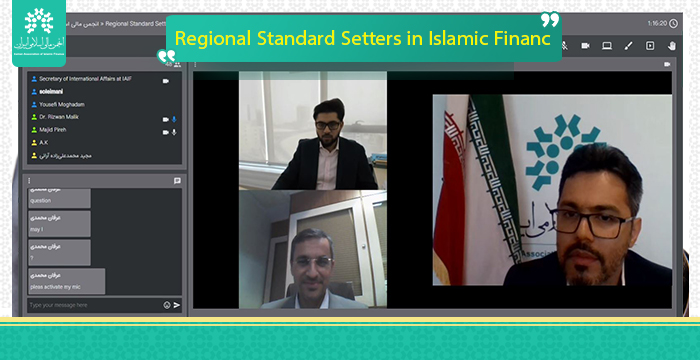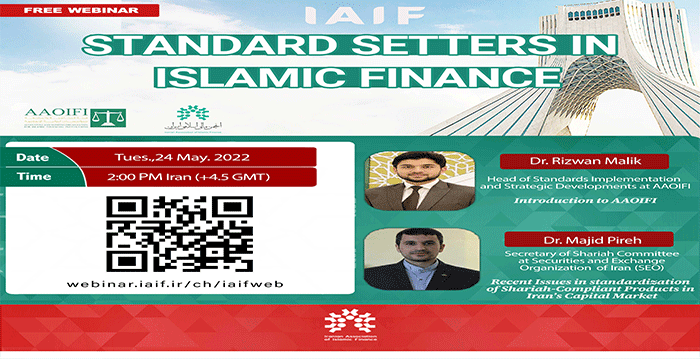

The Iranian Association of Islamic Finance held an international webinar on Standard-Setters in Islamic Finance.
The Iranian Association of Islamic Finance held an international webinar on Standard-Setters in Islamic Finance on 24 May, 2022.
First speaker
Title: Introduction to AAOIFI
Dr. Rizwan Malik, Head of Standards Implementation and Strategic Developments at AAOIFI
At first the speaker talked about the history of Islamic finance developments, saying 1in 1960s Perbadanan Wang Simpanan Bakal-Bakal Haji (PBSBH) was founded in Malaysian, which was the first attempt to form Islamic banks and following that Dubai Islamic Bank and Kuwait Finance House were established. Also in 1990s conventional banks started to open Islamic branches and offered Islamic products.
Malik mentioned the principles and features of Islamic and conventional finance are fundamentally different which poses unique risks that cannot be addressed by conventional systems and standards because of prohibition of Riba, Gharar, Maysir and shariah non-compliant businesses.
He said according to IMF, Islamic finance is rapidly expanding US$ 3 trillion and is getting systematically significant.
As to the integrity of Islamic finance, Head of Standards Implementation and Strategic Developments at AAOIFI stated this integrity involves ensuring that the industry:
1- Doesn’t compromise the minimum level of shariah-compliance in all areas of operations.
2- Uniformly moves in one direction towards realization of Maqasid Al Shari'ah.
3- Adopts the best practices
4- Enjoys trust and confidence of its stakeholders
5- Is stable, sustainable, and competitive
Regarding how to secure the integrity of Islamic finance, Malik mentioned standardization and harmonization o in Islamic finance are the best practices, going on to say that Standardization is the process of creating standards to guide the creation of products and services, in harmony, acceptable to and meeting the needs of the maximum stakeholders of an industry.
The standards ensures that products and services produced in a specific industry come with:
Consistent quality;
• are equivalent to other comparable products or services in the same industry; and
• meet the industry expectations – from the perspective of different stakeholders.
Moreover, Standardization focuses on the product creation process, operations of businesses, technology in use, and how specific compulsory processes are instituted or carried out.
Somewhere else the speaker talked about the key arguments in favor of standardization, saying standardization leads to higher levels of trust because of higher:
Comparability
Transparency
Reliability
Understandability
Accountability
Timeliness
Furthermore, economy, investors and Islamic financial institutions can benefit standardization. For example economy can attracts foreign investment, have better resource allocation, increase wealth and so on.
Islamic financial institutions can also benefit standardization through better governance, lower cost of capital, reduced costs, higher productivity, higher legal security, higher adaptability, appropriate risk management etc.
Dr. Rizwan Malik said AAOIFI has issued 117 standards and technical pronouncements in last 5 years; 59 in shariah, 35 in accounting, 8 in auditing, 14 in governance and one in ethics. In addition, AAOIFI’s secondary objectives are capacity building, advocacy and awareness, technical bulletin (JOIFA), advisory and assurance services.
He pointed out that 37 countries are directly in touch with AAOIFI and AAOIFI areas of work are as follows:
Standard development: Five interrelated areas: Shari’ah, accounting, auditing, governance and ethics
Capacity building: Two professional qualifications are offered: i) Certified Islamic Professional Accountant (CIPA); and ii) Certified Shari’ah Advisor & Auditor (CSAA)
Awareness and advocacy: Two international conferences are held on an annual basis since the last 18 years. Other events include public hearings, workshops, seminars, roundtables, etc. Additionally, Journal of Islamic Finance Accountancy (JOIFA) is published.
Certificate of compliance: Certifications of compliance to AAOIFI standards offered mainly for software solutions providers.
About the fundamental differences in Islamic and conventional banking, Rizwan said Islamic banks are subject to unique risks that pose challenges for their legal and regulatory frameworks… Although, in principle, conventional resolution tools can be applied to Islamic banks, frameworks that address the particular challenges posed by Islamic finance will need to be developed.
Islamic finance, governed by Shari'ah principles, offers its own unique approach to risk sharing and management… Islamic banks face unique challenges in the following areas: displaced commercial risk, withdrawal risk, governance, fiduciary risk, transparency, Shari'ah risk, and reputational risks.
While Islamic financial instruments share the merits of conventional ones, they have certain distinct features that differentiate them from their counterparts.
He touched upon different boards at AAOIFI which are responsible for solving the problems in the standards and technical pronouncements.
Shari’ah Board: A technical board responsible for issuing, reviewing and updating the Shari’ah standards. The board has the absolute power in this respect as it represents the main reference and authority for the Islamic finance industry worldwide, whose standards are widely applied globally.
Accounting: A technical board responsible for issuing and reviewing the accounting standards and all related materials including guidelines, researches, interpretations, and other related scientific and professional products.
Governance and Ethics Board: A technical board which shall be responsible to carry out development and review of governance standards and codes of ethics, and all related materials including guidelines, researches and interpretations.
Finally Dr. Rizwan Malik explained the standard development process at AAOIFI which is Identification of the projects: by secretariat / technical board, Working group formation / subcommittee allocation, Executive team formation, Preliminary study and consultation notes (in one or two steps), Presentation before technical board for principle setting (in one or two steps), Workshop(s) survey(s) (if needed), Draft standard for technical board, Review of draft standard by technical board, Exposure draft, Review of exposure draft by Shari’ah committee (if applicable), Public hearing(s), Review of exposure draft by Public Interest Monitoring and Consultive Committe (PIMCC) (if applicable), Review of the final standard by the working group with industry comments, Review of the final standard by technical board with industry comments and final standard.
Second speaker
Dr. Majid Pireh, Secretary of Shariah Committee at Securities and Exchange Organization of Iran (SEO)
Title: Recent Issues in Standardization of Shariah Compliant Financial Products in Iran’s Capital Market
The speaker at first talked about the history of sukuk in Iran which dates back to 1994, issued under the supervision of the Central Bank of Iran and it was Musharakah.
He went on to say that Ijarah, Murabaha, Istisna are known as fixed income structures, while Salam and Musharakah are known as variable income structures. Also, structures do not necessarily utilize Special Purpose Vehicles (SPV).
Special Purpose Vehicles make some tax benefits for the issuers; however, there are some laws which permit tax-exemptions specific structures do not use SPV.
Regarding the requirements for success of development ideas in Iran capital market, Pireh mentioned there are various requirements which are as follows:
Policy Requirements which are macro policies for development of financial products and development of governance systems for investors’ protection.
Shariah Requirements which are studying Shariah related aspects at national and company levels and development of Fatwas.
Legal Requirements which are introducing protective rules and regulations and increasing issuer/investors’ incentives.
Technical requirements which are providing profit realization mechanism for variable income sukuk and preparation of listing, pricing, trading and final settlements necessities.
As to financial products in Iran capital market, Secretary of Shariah Committee at Securities and Exchange Organization of Iran ststed that before 1979 there were just equity and bonds and between 1979 to 2007 there were equity and musharakah sukuk, but from 2007 to 2022 the variety of the financial products increased remarkably; Equity, Musharakah Sukuk, Murabaha Sukuk, Ijarah Sukuk, Salam Sukuk, Manfa’ah Sukuk, Shariah compliant Mortgage Backed Securities, Islamic Treasury Notes, Shariah compliant Derivatives (futures and options) and Shariah compliant funds.
Finally he suggested that the students of the Iranian Association of Islamic Finance in MBA and DBA courses in Islamic capital achieve AAOIFI’s certificates to be more successful in their professional lives.


